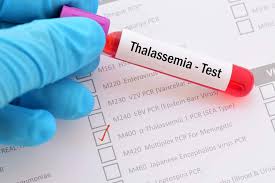Thalassemia is a genetic disease caused by mutations in the genes of α- and β-globin. This condition causes a reduction in the amount and function of hemoglobin in red blood cells. This genetic disease is most often found in the Mediterranean, China, South Asia and Southeast Asia, including Indonesia. In 2017, there were 8,011 patients with Thalassemia in Indonesia and it is predicted that there will be an increase of 3,000 people every year. In East Java alone, the number of Thalassemia sufferers has increased, in 2007 there were 159 children, in 2015 it had reached 470 children and in 2017 it increased to 520 children. Thalassemia is divided into thalassemia minor, intermediate, and major. Patients with thalassemia minor or carriers are often not aware because there are no visible symptoms. Meanwhile, intermediate sufferers usually need blood transfusion therapy before adolescence or young adulthood. And thalassemia major is a condition in which both genes have abnormalities, resulting quite severe symptoms. Patients with thalassemia major require blood transfusions early on and throughout their lives if bone marrow transplant or genetic therapy is not done.
This genetic disease is the fourth largest disease that spends BPJS fund, which reached 2.15 billion in 2014 and doubled to 4.77 billion in 2016. This cost will certainly continue to increase if the disease chain requires treatment since the beginning of life did not stopped. Knowing everyone’s thalassemia status before marriage is one important step to reduce the incidence of thalassemia major. For this reason, an understanding of this disease, along with how to prevent it, needs to be given to prospective parents. Unfortunately, the current COVID-19 pandemic has limited human activities in all fields, including health education. However, this kind of condition forces people to be creative and innovative, including using technology in the form of the internet. However, the effectiveness of this method is still questionable. Therefore, FK UNAIR’s Translational Medicine and Therapeutic (TMT) research group consisting of experts in molecular pharmacology, clinical pathology, and psychiatry tried to conduct early education about thalassemia in peer-based high school students in Surabaya. With peer education, hopefully, it can be more accepted by high school students because the language used is more age-appropriate and easy to digest. By using social media that is widely accessed and frequently used, including Zoom, YouTube and Instagram, this education can still be done in this time of the COVID-19 pandemic.
A research was conducted on 57 senior high school students in Surabaya, and the result showed that the students’ knowledge on thalassemia is quite good and improved after the education conducted through social media. The education is not related to their ages, sexes, classes, and extracurricular activities. But after an in-depth interview, it can be seen that they did not have thorough understanding about it. They still do not know whether it is infectious disease and they were not sure whether they want to perform screening because they did not have anemia symptom, and there was not awareness that it is one of the characteristic of thalassemia. The gap between knowledge and understanding may be caused by the time given to them and they were not being watched when answering the questions.
Apart from the above results, this study concluded that by empowering peers, health education, one of which is about thalassemia, the messages conveyed are more acceptable to high school students. In addition, online education methods are possible for other health education. However, the speed and stability of the internet is important to ensure that the messages received are intact and uninterrupted. Moreover, the timing of the implementation is very crucial, because high school students have academic activities, which may make students unfocused when receiving education.
Author: Annette d’Arqom, dr., M.Sc.
Details of this research can be viewed in our work at:
https://www.emerald.com/insight/content/doi/10.1108/JHR-09-2020-0442/full/html
d’Arqom, A., Indiastuti, D.N. and Nasution, Z. (2021), “Online peer-group activism for thalassemia health education during the COVID-19 pandemic: a case study from East Java, Indonesia”, Journal of Health Research, Vol. ahead-of-print No. ahead-of-print. https://doi.org/10.1108/JHR-09-2020-0442





